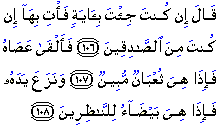Al-Araf (The Heights)
Chapter 7: Verses 106-108
 Miraculous Signs Miraculous Signs
"(Fir'aun) said: "If indeed thou hast come with a Sign, show it forth, if thou tellest the truth." Then (Musa) threw his rod, and behold! it was a serpent, plain (for all to see)! And he drew out his hand, and behold! it was white to all beholders!"
Moses was granted these two miraculous signs in order to provide testimony to his being a Messenger of God, the creator and sovereign of the universe. Whenever the Prophets introduced themselves as God's Message-bearers, people asked them to produce some miraculous sign, to perform something supernatural. In response to those demands the Prophets produced what the Quran terms as 'signs', and which are called 'miracles' by theologians.
Those who tend to play down the supernatural character of such signs or miracles, and who try to explain them in terms of natural laws of causation, in fact attempt to build a mid-way house between believing and disbelieving in the statements of the Quran. Such an approach can hardly be considered reasonable.
What it does demonstrate, however, is how such people can be pulled in two opposite directions. On the one hand, they are not inclined to believe in a Book which abounds in narrations of a supernatural kind. On the other hand, being born followers of their ancestral religion, they are not inclined to reject the Book which carries supernatural narrations.
With regard to miracles, there are two basic questions that people should ask themselves. Did God, after creating the universe and establishing a system of natural causations therein, suspend Himself such that it is no longer possible for Him to interfere in the workings of the universe? Or does He still hold the reins to His realm in His owns Hands so that His command is enforced every moment, and He does retain the power to alter the shape of things and the normal course of events - either partially or fully, - as and when He wills?
It is impossible for those who respond in the affirmative to the first question to accept the idea of miracles. For clearly miracles do not fit in with their concept of God and the universe. Honesty demands that instead of indulging in far-fetched explanations of Quranic statements on miracles, such people should clearly declare that they do not believe in the Quran. For quite obviously the Quran is explicit, even quite definite in affirming the former concept of God.
As for those who, being convinced by Quranic arguments, respond in the affirmative to the second question regarding God and the universe, for them there is no difficulty in accepting miracles.
Source:
"Towards Understanding The Quran" - Sayyid Abul Ala Mawdudi |